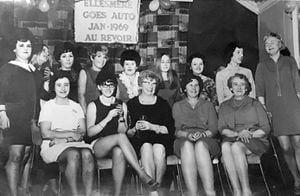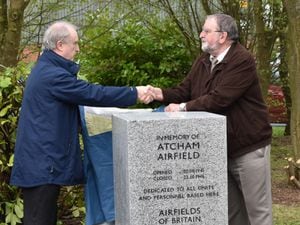Day they pulled the plug at Ellesmere's exchange
Fifty years ago they pulled the plug forever on Ellesmere's manual telephone exchange.

With the march of progress, it was replaced with a new automatic exchange, marking the end of a telephone era, as it was the only manual one left in the Shrewsbury area.
But there are still switchboard operators around who can recall the old days, in which operators would put calls through and, in Ellesmere, sound the siren if there was a report of a fire – and then tell the fire service where it was when they rang in to ask.
Harry Orr, a teacher of sociology at Ellesmere College, has been delving into the story of those who worked at the Ellesmere exchange, and in doing so has had a "star witness" in the form of Ann Harris, of Ellesmere, who worked there until its closure.
Harry has chatted to Ann about her memories of those days, when the exchange was in rooms above the Post Office in Scotland Street in the town.
It had opened in January 1905, with only 18 subscribers, and one operator who worked from 11am until 5pm. There was no night or weekend service.
By 1928, says Harry, there were 100 subscribers, with a Miss Sellars as the supervisor. She worked there until closure in 1969 when there were 471 lines and six operators.
"Ann Harris worked as an operator and she told me her story over dinner," said Harry.
"Ann Lovell, as she was then, left Whitchurch High School for Girls when she was 16 and applied to become an exchange operator.
"Being an operator required a number of skills. Passing the 11-plus, attending the High School and a good knowledge of Britain were all essential.
"Ann tells me she had to pass a geography test before she was accepted for training. Training took place at Rhyl and lasted about six weeks.
"Ann and the other trainees were accommodated in a local hotel. After qualifying Ann worked in Whitchurch, later becoming a supervisor which required more training, this time in Cardiff.
"She worked there and received the generous Post Office marriage gratuity which she used to fund the purchase of her first house in 1962.
"Taking the gratuity did mean Ann had to give up her supervisor’s role so she started at the bottom again.
"After a brief stint in Oswestry, Ann arrived at the Ellesmere exchange.
"In those days to make a call, a subscriber would lift their receiver and speak directly to an operator. Telephones then had no dials.
"‘Number, please?’ Ann would reply before either putting the number through or contacting another exchange if the call was to outside Ellesmere.
"Ann knew most, if not all, the local numbers off by heart. She remembers her own home number was 163.
"She would also have to fill in a chit with the duration and the location of the call logged so accounts could bill the subscriber later.
"Although Ann and the other telephonists could listen in to any conversation, they all, as civil servants had to sign a secrecy act.
"Shifts would run from 8am till 6pm, entering the Post Office by the side door.
"Being late would result in a penalty. Being late three times would end in dismissal.
"The exchange was manned all year, round the clock. At night Mrs Humphries looked after the exchange.There was a bedroom above so night cover could sleep, but if a call came, a loud bell would wake you up.
"It was while working there that Ann met her great friends Jean and Denis Roberts.
"Ann remembers how she dealt with calls reporting a fire. She would leave her seat and set off the siren that would then sound all over town.
"The fire brigade would then call the exchange to find out where the fire was!
"She also remembers a naughty girl who liked to make rude phone calls to the exchange from a phone box. Unfortunately for the girl, she used the box outside the exchange and was unaware that the operators could see her making the calls.
"Ann enjoyed her work there, especially in accounts. The Post Office were generous employers, and Ann and the other telephonists liked being on ‘relieving’ duty which meant having to go to other exchanges and being put up in hotels.
"Apparently the Post Office paid generously and there was a profit to be made!
"When the exchange closed in 1969, Ann went to work at Peter Stead’s vets.
"She remembers her work there fondly."
The manual exchange above the Post Office closed in January 1969 and was superseded by a new exchange in Cemetery Road.





